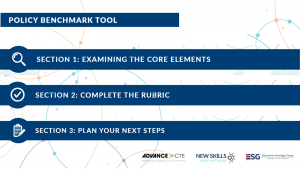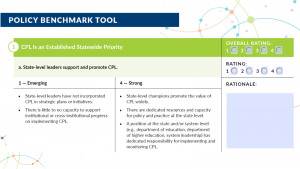![]() In December 2021, Advance CTE and Education Strategy Group (ESG) convened the Credit for Prior Learning Shared Solutions Workgroup in service to the New Skills ready network sites. The work group was tasked with evaluating the policies and practices that enable credit for prior learning (CPL) to be implemented effectively within career pathways.
In December 2021, Advance CTE and Education Strategy Group (ESG) convened the Credit for Prior Learning Shared Solutions Workgroup in service to the New Skills ready network sites. The work group was tasked with evaluating the policies and practices that enable credit for prior learning (CPL) to be implemented effectively within career pathways.
This workgroup convened in service to the New Skills ready network sites, which are working to improve career pathways, expand real-world work experiences, improve transitions and close equity gaps. Evidence increasingly shows that CPL can boost learners’ completion rates in a way that saves them time and money.
A survey fielded by the Council for Adult and Experiential Learning (CAEL) and Western Interstate Commission on Higher Education (WICHE) found that adults who earned credit for prior learning were 17 percent more likely to complete a credential. Notably the impact was even greater for Hispanic learners, who experienced a 29 percent increase in credential completion, and Pell recipients, who are 19 percent more likely to complete a credential if they have earned CPL.
“Credit for Prior Learning is a crucial way for students to save time and money in pursuing a credential or degree,” says Georgia Reagan, strategy officer with Lumina Foundation. “However, students aren’t always aware of the opportunities available at their institutions. The Credit for Prior Learning in Career Pathways tool will be a valuable guide for higher education and policy leaders who want to create clear, accessible, and equitable processes that will help students in turning their prior learning experiences into invaluable college credits.”
To build more inclusive on-ramps to high quality postsecondary education, CPL processes should be expanded to reflect learners’ postsecondary-level learning gained through their life, educational and occupational experiences. This includes the common methods of assessing and awarding CPL, such as standardized examples, as well as work-based learning and industry-recognized credentials earned in high school, validated on-the-job training and non-credit, and non-degree coursework.
The workgroup designed a comprehensive Policy Benchmark Tool (PBT) to better support states, systems and institutions in embedding CPL in career pathways.
Getting Started
 Effective use of the PBT requires intentional collaboration and planning. It is composed of three sections to enable users to: understand the core elements of strong CPL policy and practice, assess where their own policy and practice is strong and where opportunities remain, and create an action plan to improve the effective use of CPL in learners’ career pathways.
Effective use of the PBT requires intentional collaboration and planning. It is composed of three sections to enable users to: understand the core elements of strong CPL policy and practice, assess where their own policy and practice is strong and where opportunities remain, and create an action plan to improve the effective use of CPL in learners’ career pathways.
“With the recent decline in Indiana’s college-going rate, CPL opportunities will be critical to increasing the state’s postsecondary access, equity, and completion rates,” says Dawn Clark, Director of Academic Affairs and Transfer at the Indiana Commission for Higher Education. “As CPL awareness and opportunities continue to grow, consistent institutional policies and practices will help students earn credentials more quickly and affordably. The Credit for Prior Learning Policy Benchmark Tool could not have come at a better time!”
For optimal results, Advance CTE recommends that users:
- Compose a diverse team to complete the PBT’s self assessment rubric, including state agency staff, postsecondary system leaders, institutional practitioners, workforce development and industry partners and, most important, learners.
- Gather data and guiding documents to inform the self-assessment. Users may identify CPL participation and outcomes data, statewide or articulation agreements, approved credential lists, and institutional policy documents as potential supporting evidence.

- Complete the self-assessment as a core team and gain an understanding of your ratings prior to soliciting additional input. Users may find that additional input is needed from learners, community-based organizations or employer partners, for example, to accurately rate how well CPL is understood and accessed as a career pathways strategy.
- Identify priority action areas to address first based on existing policy and practice, as well as other conditions in your state. There are always ways to improve CPL, and this tool illustrates the many areas a state, postsecondary education system or institution could focus on to improve the effectiveness of CPL.
Advance CTE staff are available to support CTE leaders in this important work. Please contact Candace Williams, Data & Research Manager, at cwilliams@careertech.org for more information about this initiative.
Candace Williams, Data and Research Manager

